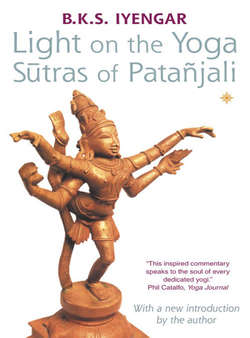Читать книгу Light on the Yoga Sutras of Patanjali - Литагент HarperCollins USD - Страница 31
Seven states of wisdom
ОглавлениеAfter explaining the functions of nature and of the seer, Patañjali speaks of the seven states of understanding or wisdom (prajña) that emerge from the release of nature’s contact with the seer. First let us identify the seven corresponding states of ignorance, or avidya:
1 smallness, feebleness, insignificance, inferiority, meanness
2 unsteadiness, fickleness, mutability
3 living with pains, afflictions, misery, agony
4 living with the association of pain
5 mistaking the perishable body for the Self
6 creating conditions for undergoing sorrow
7 believing that union with the soul (yoga) is impossible, and acting as though that were so
The seven states of wisdom are:
1 knowing that which has to be known
2 discarding that which is to be discarded
3 attaining that which has to be attained
4 doing that which has to be done
5 winning the goal that is to be won
6 freeing the intelligence from the pull of the three gunas of nature
7 achieving emancipation of the soul so that it shines in its own light
These seven states of wisdom are interpreted as right desire, right reflection, disappearance of memory and mind, experiencing pure sattva or the truth (reality), indifference to praise and blame, reabsorption of phenomenal creation, and living in the vision of the soul. They may be further simplified as:
1 understanding the body within and without
2 understanding energy and its uses
3 understanding mind
4 consistency of will
5 awareness of experience
6 awareness of pure quintessence, sentiment and beauty
7 understanding that the individual soul, jivatman, is a particle of the Universal Spirit, Paramatman
The Yoga Vasista correlates this sutra (II.27) with the seven stages of individual development:
1 study and cultivation of the company of wise men
2 capacity to solve problems
3 development of non-attachment
4 dissolution of inherent faults
5 working towards the bliss in which a half-sleeping and half-wakeful state is experienced
6 experience of a deep sleep state
7 attaining a state in which purity, tranquillity and compassion flow out towards others.
The seven frontiers of awareness also correlate with the five sheaths or kosas of the body. Consciousness is the sixth, and the inner self, the seventh.
Patañjali describes the seven states of awareness as:
1 emerging consciousness (vyutthana citta)
2 refraining consciousness (nirodha citta)
3 tranquil consciousness (santa citta)
4 one-pointed consciousness (ekagra citta)
5 sprouted consciousness (nirmana citta)
6 rent consciousness (chidra citta)
7 pure consciousness (divya citta)
(See III.9, 10, 11; IV.27 and 29.)
It is also possible to consider the ethical, physical, physiological, neurological, emotional, intellectual and spiritual domains as the seven states of awareness. When one rests on the vision of the soul, divinity is felt in this empirical state.
